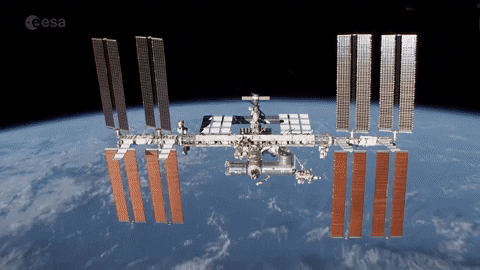ISS - Expedition 68 Mission patch.
March 24, 2023
The Expedition 68 crew members conducted space health experiments and prepared for the final plant harvest aboard the International Space Station while inspiring the next generation of explorers in a virtual robotics competition.
NASA Flight Engineer Woody Hoburg spent most of his day installing tissue cassettes for the BFF-Meniscus-2, an investigation to print and culture a meniscus using the BioFabrication facility aboard the space station. Crew members who experience musculoskeletal injuries on future deep space missions may benefit from the capability to bioprint tissue to promote recovery. The research could lead to the ability to print complex tissues and organs that may be used to treat patients on Earth.
Image above: NASA astronaut and Expedition 68 Flight Engineer Frank Rubio checks tomato plants growing inside the International Space Station for the XROOTS space botany study on Oct. 14, 2022. Image Credits: Koichi Wakata/Japan Aerospace Exploration Agency (JAXA).
NASA Flight Engineer Frank Rubio conducted the Astrobee-Zero Robotics operations, a programming competition where students earn the opportunity to control an autonomous flying robot and observe its performance aboard the space station. Finalists have their code downloaded by NASA to the Astrobee platform and observe its performance. Rubio also continued to transfer the 6,200 pounds of research hardware and supplies between the orbital outpost and the uncrewed SpaceX CRS-27, which arrived at the space station on March 16.
Afterward, Rubio spent the rest of his day preparing for the final harvest of the Veg-05 plants by collecting plant swabs and water samples to be stored in cold stowage for later use in research. The plant botany study is the next step in addressing the need for a food production system in space. The Vegetable Production System supplies crew members with a continuous source of fresh food and a tool for relaxation and recreation.
International Space Station (ISS). Animation Credit: ESA
NASA Flight Engineer Stephen Bowen installed Materials International Space Station Experiment-17-Commercial hardware onto the Japanese Experiment Module airlock slide table. The investigation tests how the space environment affects the durability of materials and components, including 3D-printed polymers, thermal protection systems, spacecraft materials, biopellets made from dried microbes, paraffin wax thermal protection, and thin solar cells.
Flight Engineer Sultan Alneyadi from UAE (United Arab Emirates) removed the Dry-EEG Headband and synchronized the unit to the European Physiology Module laptop for data transfer. The sleep monitoring technology investigates astronauts’ sleep quality by measuring duration, sleep stages, heart rate, and the number of awakenings. Alneyadi then positioned the Astrobee free flyer in the Japanese Experiment Module and conducted software test runs.
Image above: Sept. 21, 2022 - The Soyuz MS-22 crew ship, carrying NASA astronaut Frank Rubio and Roscosmos cosmonauts Sergey Prokopyev and Dmitri Petelin, approaches the International Space Station for a docking 262 miles above the Adriatic Sea off the coast of Croatia. Image Credit: NASA.
Flight Engineer Andrey Fedyaev of Roscosmos continued to replace the condensate evacuation lines that carry away excess moisture from the cabin atmosphere. Meanwhile, Roscosmos cosmonauts Sergey Prokopyev and Dmitri Petelin prepared cargo to return in the Soyuz MS-22 spacecraft, slated to undock from the station’s Rassvet module on March 28.
Related article (NASA):
NASA Coverage Set for Uncrewed Soyuz Undocking, Departure
https://www.nasa.gov/press-release/nasa-coverage-set-for-uncrewed-soyuz-undocking-departure
Related links:
Expedition 68: https://www.nasa.gov/mission_pages/station/expeditions/expedition68/index.html
BFF-Meniscus-2: https://www.nasa.gov/mission_pages/station/research/experiments/explorer/Investigation.html?#id=8743
BioFabrication facility: https://www.nasa.gov/mission_pages/station/research/experiments/explorer/Facility.html#id=7599
Astrobee-Zero Robotics: https://www.nasa.gov/mission_pages/station/research/experiments/explorer/Investigation.html?#id=7856
Veg-05: https://www.nasa.gov/mission_pages/station/research/experiments/explorer/Investigation.html?#id=7443
Vegetable Production System: https://www.nasa.gov/mission_pages/station/research/experiments/explorer/Facility.html?#id=374
Materials International Space Station Experiment-17-Commercial: https://www.nasa.gov/mission_pages/station/research/experiments/explorer/Investigation.html?#id=8947
Dry-EEG Headband: https://www.nasa.gov/mission_pages/station/research/experiments/explorer/Investigation.html?#id=8344
Space Station Research and Technology: https://www.nasa.gov/mission_pages/station/research/overview.html
International Space Station (ISS): https://www.nasa.gov/mission_pages/station/main/index.html
Images (mentioned), Animation (mentioned), Text, Credits: NASA/Heidi Lavelle.
Best regards, Orbiter.ch




